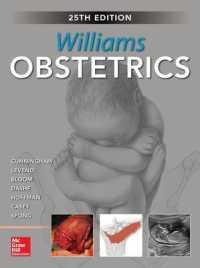- ホーム
- > 洋書
- > 英文書
- > Psychology
Full Description
Guided by developmental cultural psychology, this volume focuses on understandings and responses to disability and stigmatization from the perspectives of educators practicing in Japan, South Korea, Taiwan, and the United States. Synthesizing research that spanned over a decade, this volume seeks to understand disabilities in different developmental and cultural contexts.
The research presented in this book found that educators from all four cultural groups expressed strikingly similar concerns about the impact of stigmatization on the emerging cultural self, both with children with disabilities and their typically developing peers, while also describing culturally nuanced socialization goals and practices pertaining to inclusive education. In providing a multicultural view of common challenges in classrooms from around the world, this book provides important lessons for the improvement of children's lives, as well as the development of theory, policy, and programs that are culturally sensitive and sustainable.
Contents
Acknowlegements
Guide to Japanese, South Korean, Taiwanese, and U.S. Terms/Concepts
Part 1: Introduction
Chapter 1. Overview
Part 2: The Contexts of Educational Practice
Chapter 2. Cultural-historical contexts
Chapter 3. Educational policy and practice contexts
Chapter 4. Children's development as context
Interlude 1: The Voices of Children
Part 3: Educators' Perspectives
Chapter 5. Research program
Chapter 6. Disability and stigmatization as threats to the cultural self
Chapter 7. Preventing and repairing harm to children's cultural self
Chapter 8. Parent-educator relationships
Interlude 2: The Voices of Parents
Part 4: Conclusion
Chapter 9. Lessons learned and ways forward
Appendix A: Definitions of special education disability categories in four countries
Appendix B: Diagnostic criteria for disabilities in ICD-10
References







